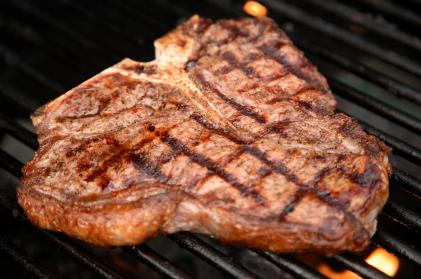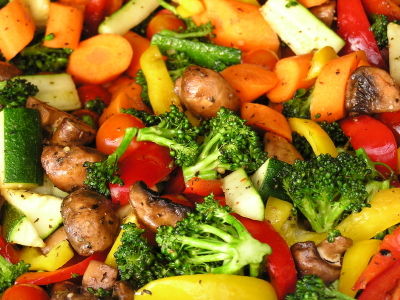The Great Vegetarian Debate
Don’t Feel Irate If Meat’s On Your Plate
The Great Vegetarian Debate
© 1998 by Nenah Sylver




Vegetarianism: once the bane of knowledgeable palates and relegated to the domain of eccentrics, it is now—in some circles, at least—considered chic. Those fiber-rich, green growing marvels are being lauded even in more traditional circles as allies of healthier hearts and colons and reducers of all sorts of things from cholesterol to excessive libidos.
However, there still persists the notion that vegetables are for flakes. People who don’t eat meat are regarded as counter-culture hippies, New Age space cadets, utterly lacking in taste, and/or just plain weird. I suppose this is why many folks often assume I’ve forsworn meat, even though I like my steak (organic, of course) as juicy and rare as the next gal. As a practitioner of hands-on healing, I have been known to talk about feeling "energy," receiving guidance from other realms, and communing with my houseplants. Not only that, I even wear a crystal sometimes. What better identifying markers than these to brand me with the moniker, "No animal flesh eaten here"?
Thus did my predilections unintentionally cause a ruckus during a recent dinner outing with some politically progressive acquaintances. Collectively, these people had visited Nicaragua, done public interest law for the homeless, gone on AIDS walks, and demonstrated for clean air, abortion rights, and the ethical treatment of animals. However, to the degree that they were political, they were also pragmatists. They knew next to nothing about the paranormal or metaphysics, which from their perspective did not constitute "real life"—and thus did not merit the attention or effort they put into Things Undeniably Real. You can imagine how much of a stretch it was for them to hear me talk about "negative energy." Despite my metaphysical leanings, however, these highly political friends tolerated and even liked me. I surmised that my feminist and bisexual activism (through my writing and music) provided a counterbalance to what they considered my unusual approach to life.
But there was no way my nine table companions could have been prepared for my meal order. As soon as I asked the waiter for brisket, all conversation at my table instantly stopped and everyone stared at me. The six others of our group at the adjacent table leaned over in a single wave to stare at me too, and contemplate my preference. I knew most of them weren’t vegetarians, so it wasn’t a moral judgment. They were simply surprised—or should I say shocked. Someone who regularly blew sage through her apartment and was involved in "spiritual" things like meditation, eating meat? It just didn’t compute.
Of course I was thrilled to demolish the stereotype. "My metabolism requires meat," I explained gleefully, adding, "Besides, I love the taste. And the energy is very grounding. Meat feels really good to eat."
My political friends accepted this without further comment. However, with many vegetarians, I have a bone to pick. Some of the harshest criticism and outright verbal assault I have received for eating meat has come from vegetarians who claim to be peaceful, non-violent, and loving.
Many of us are familiar with some of the arguments against eating meat. A few of these points seem reasonable and humane, borne of concern for the earth and its creatures. With the exception of animals raised organically, the conditions under which most are produced—in factory farms—are abominable: dirty, crowded, with the resulting force-feeding of antibiotics to eliminate the disease that logically ensues from such circumstances. In another vein is the growing awareness about the folly of raising animals for food when we could be growing grain directly for human consumption. According to Frances Moore Lappe in Diet for a Small Planet, it ordinarily takes seven pounds of grain and soybeans to produce one pound of livestock flesh for human consumption. For cows, however, the amount of vegetation required to produce one pound of beef jumps to an astronomical sixteen pounds.
Simply put, this argument says that it’s more efficient for humans to eat grain and beans than cows. From the hamburger conglomerates’ uncaring destruction of the rainforests to the newest abomination of forcing chickens to wear red contact lenses in order to encourage more rapid egg laying (apparently it would be too expensive to redesign the henhouses with red lights), eating animals has been cited as unethical, unhealthy, or both.
But for someone who requires some animal protein in her diet in order to function optimally, being indicted by a vegetarian as an unfeeling murderer makes me wonder if their "beef" isn’t somewhat misplaced.
In a popular California grassroots newsletter, a reporter from the Sacramento Vegetarian Society criticized Earth First! activists for eating hamburgers at a political rally. In the same column, he attacked the Sacramento Natural Foods Cooperative for servicing their customers by carrying organic meat, mentioning his disgust at having to pass "dead animals" on his way to the brown rice and appraising carnivores as "enslaving and murdering animals." I say it’s time to stop this self-righteous moralizing in the name of protecting those poor cows and look at meat eating in its proper perspective.
Of the many reasons cited why people are—or if they’re not, should be—innate vegetarians, one item discussed the most often is the length of the human intestinal tract. Because it’s so long, claim vegetarian proponents, animal flesh putrefies before it’s excreted. Our ancestors, they insist, survived on nuts, berries and dandelion roots just fine; therefore, any deviation from this in today’s world means we’re all insensitive gluttons. There is something inherently racist about this assumption. One look at the indigenous diet of the North American Inuit (Eskimo)— a diet that largely consists of cholesterol-free, omega fatty acid-rich fish such as salmon—lays this stereotype to rest. (It’s hard to imagine that these natives had ever lived differently before becoming "corrupted"— that prior to eating animal flesh, they were busy hacking away at all that greenery growing underneath the ice.) Furthermore, anthropologists who chronicle the eating habits of other aboriginal peoples report that even those on a "vegetarian" diet will frequently ingest slugs and small animals such as lizards, birds and rodents for variety and nutrition.
Another consideration of whether someone should eat meat is the person’s metabolism. According to well-researched data on metabolic classification and blood types, some people are unable to extract adequate protein solely from vegetables and grain. Because our earliest ancestors were carnivores—the cultivation of grains occurred much later than the hunting of animals for food—genetically some people have not yet completely adapted to assimilating grains. This is confirmed by the current numbers of people with diabetes and hypoglycemia, who feel better on a diet that includes animal protein, because even complex sugars and carbohydrates increase blood sugar levels too rapidly and put too much strain on the pancreas. Twentieth-century dentist Weston Price became convinced of the role animal protein played in a healthy diet after photographing aboriginal and native peoples and comparing the teeth of those who ate meat and those who did not. The differences were striking: parents who, like their parents before them, had beautiful straight teeth, gave birth to children with misshapen molars because they did not have adequate animal protein in their diet. Finally, according to food expert Annemarie Colbin in her book Food and Healing, people who spend time under florescent lights, or who work with machinery, electronics or computers, actually require the grounding that animal flesh provides. Just as human sexuality follows a broad continuum from straight to bisexual to gay, people’s metabolism—just like that of animals—ranges from completely vegetarian to a-steak-a-day.
It is also important to remember that within one person’s lifetime, dietary needs may vary. One day, eating beans might make someone fart; on another day, nary a cubic inch of excess gas will grace the surrounding air.. Also, there is the possibility that one can develop (if one doesn’t have it already) an allergy to soy, which is notoriously difficult to digest, or to dairy, which some people can’t digest at all because lactose intolerance is built into their genes.
Nonetheless, a great many vegetarians seem eager to consign an organic meat-eater to a stall with the other offenders. It’s unlikely that my lone munching outweighs the atrocities perpetrated by the fast food chains and the hormone-injecting animal agribusiness. There’s a huge difference between meat eaters who are responsible and want to know how the animals are raised, and those who routinely chomp away on rainforest-depleting Big Macs and wouldn’t even look at a bean dish if you put it in front of them. Perusing much of the vegetarian literature, whose proselytizing rivals religious zeal in its search for "converts," one can reasonably conclude that the planet consists of good guys—vegetarians—and bad guys, those who aren’t.
The manner in which we consume our food has a lot to do with how it comes out the other end. I’d rather be served a home-cooked brisket (even if it’s not organic), accompanied by a cheery "Eat, eat!" than a vegan meal that has been meticulously and solemnly prepared according to rigorous spiritual principles. Hardening of the arteries can doubtless be caused as much by one’s rigid adherence to a belief system as by a nice marbled prime rib. Mark Twain once said that good habits should be broken now and then to prevent us from becoming ossified.
Given the variety and richness of the human organism, then, people’s diets will naturally reflect the diversity of their geography, culture, metabolic type, and changing needs. This is the same richness and variety that the Native Americans recognized, and which enabled them, when they killed an animal for food, to bless it and thank the Great Creator for sustenance. To me, this lifestyle is infinitely more "spiritual" than any system that exhorts its followers to adhere to a set of principles because they’re the correct ones. It is possible to revere the earth as a living system and appreciate the support that the food chain provides, even if that support includes cows, deer and fish. Not one vegetarian I have spoken to has ever bothered to ask me why I eat meat.
What I eat, I eat with gratitude. Every bite reaffirms my connection to not only the earth but to myself, as I become more energetic and whole. I will continue to eat meat as long as it enables me to do my work, and to celebrate and foster life.
It will be a relief when dyed-in-the-wool vegetarians respect meat-eaters who try to obtain their nourishment in ways that consider the planet’s resources—when so-called animal lovers refrain from denigrating their fellow mammals who don’t meet their standards of acceptability. The cultural workers who saw me wolf down my brisket obviously did not feel threatened. They were willing to allow themselves to stretch their belief systems and be open to another perspective. My complaint with the political activists who promote animal rights is not their assertion that animals need to be respected (as indeed every creature of the earth should be). My concern is that they give other humans the respect and consideration they claim to have for animals.
* * *
This essay was awarded Second Place in the 1996-1997 Writing Contest
of the magazine Eclectic Rainbows.
For much more detailed information
on what has been discussed here,
including a wide variety of other health-related topics,
see The Rife Handbook of Frequency Therapy
by this author.








